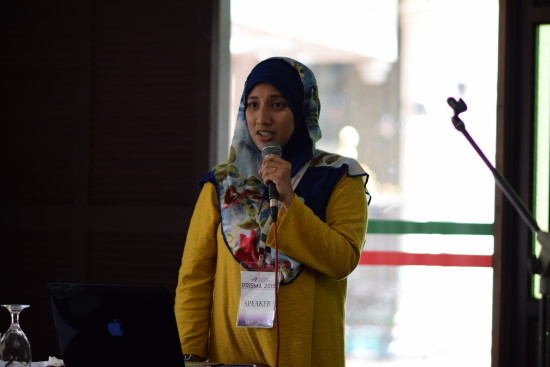
Dr Ezura Madiana Md Monoto : ‘Sometimes they don’t readily suckle when you offer the breast because they are too tired to suck. What you can do is stimulate your let-down reflex by expressing a bit of the milk onto the nipple and that will encourage the baby to suck.’
DOWN Syndrome children are just like other children. They are not happy all the time – this is a myth. And, it is not a mental disorder; Down Syndrome (DS) is a chromosomal disorder.
These are some of the facts presented by Dr Ezura Madiana Md Monoto, lecturer and family medicine specialist at Universiti Kebangsaan Malaysia Medical Centre, at the recent PRISMA 2015 conference.
Her workshop, “The Upside of Down – Supporting Parents of Babies with Down Syndrome”, proved to be eye-opening to those not so familiar with this disorder.
She said it is important to support breastfeeding mothers because DS infants have these challenges:
- low muscle tone
- non-rhythmic sucking
- arching of the body
- over-sensitivity to stimulation
- weak reflexes for sucking and swallowing and gagging
- may tire more easily and not nurse long enough to get the hind milk, which is high in calories, resulting in poor weight gain
“What are we going to do to help these mothers? Suggest they get help from healthcare professionals, lactation consultants and counsellors, doctors, paediatricians, lactation nurses – they might be able to help offer support.
“A baby with low muscle tone usually sucks better when the head and bottom are level. So, we can suggest that they hold the baby in a modified cradle hold and support with a pillow so that the body is aligned. If the baby tends to arch the body, try to hold the body flat, with knees bent and spine rounded. You can use a swaddling blanket or modify it to a football hold.
“Sometimes DS babies don’t readily suckle when you offer the breast because they are too tired to suck. What you can do is stimulate your let-down reflex by expressing a bit of the milk onto the nipple and that will encourage the baby to suck. Look for jaw, ear and temple movement, and use the dancer hand position to support the infant’s chin.
“This will help your baby press the nipple and areola between the gums,” she added.
Dr Ezura also offered some tips about the OKU (orang kurang upaya or disabled person) card.
She pointed out that any paediatrician at a government hospital can sign the form for parents to apply for the OKU card as the signs for DS are very obvious. There is no need to go for any tests.
The OKU card provides some benefits to the holder, such as discounts when travelling on public transport (MAS, KTM – counter sales only for both), free passport and MyKad replacement.
There is also the RM150 allowance each month. However, Dr Ezura informed that there are certain criteria that need to be complied with in order to get the allowance.
For example, the child must attend the PDK (Pusat Pemulihan Dalam Komuniti or Rehabilitation Centre by government and NGO) eight times a month. This is because the allowance will be channelled to the parents through the PDK.
However, Dr Ezura reminded parents that not all the PDK centres are involved in this programme, so do check before registering your child.
“Attending eight times a month sounds easy, but it is not so when your child is prone to seizures or if your child tires easily and the centre keeps sending him home,” said Dr Ezura.
© 2015 Thots N Tots. IMPORTANT: This article was faithfully reproduced from Thots N Tots website, with the permission of the owner. To view the original article on Thots N Tots’s website, please visit http://thotsntots.com/tips-for-parents-of-down-syndrome-children/ .

Submit a comment
Your email address will not be published. Required fields are marked *
There are 0 comments